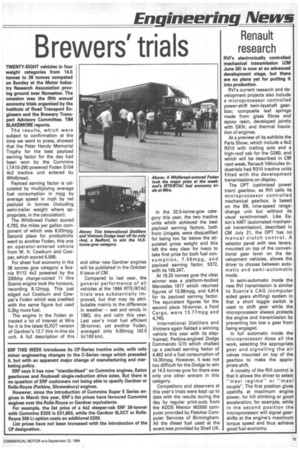Brewers' trials
Page 17

If you've noticed an error in this article please click here to report it so we can fix it.
TWENTY-EIGHT vehicles in four weight categories from 14.5 tonnes to 38 tonnes competed on Sunday at the Motor Industry Research Association proving ground near Nuneaton. The occasion was the fifth annual economy trials organised by the Institute of Road Transport Engineers and the Brewery Transport Advisory Committee. TIM BLAKEMORE reports.
The results, which were subject to confirmation at the time we went to press, showed that the Peter Hendy Memorial Trophy for the best payload earning factor for the day had been won by the Cummins LTA10-290 powered Foden S104 4x2 tractive unit entered by Whitbread.
Payload earning factor is calculated by multiplying average fuel consumption in mpg by average speed in mph by net payload in tonnes (including semi-trailer weight where appropriate, in the calculation).
The Whitbread Foden scored 6,793, the miles per gallon component of which was 8.03mpg. Second place for productivity went to another Foden, this one an operator-entered vehicle from W. H. Cowburn and Cowpar, which scored 6,598.
For sheer fuel economy in the 38 tonnes gcw category a Scania R112 4x2 powered by the 330bhp charge-cooled 11 litre Scania engine took the honours, recording 8.12mpg. This just edged out Cowburn and Cowpar's Foden which was credited with the same figure but used 0.2kg more fuel.
The engine in the Foden attracted a lot of interest at Mira for it is the latest 6LXDT version of Gardner's 12.7 litre in-line six unit. A full description of this and other new Gardner engines will be published in the October 6 issue of CM.
Compared to last year, the general performance of all vehicles at the 1984 IRTE/BTAC trials was substantially improved, but that may be attributable mainly to the difference in weather — wet and windy in 1983, dry and calm this year. Last year's most fuel efficient 38-tonner, yet another Foden, averaged only 6.65mpg (42.5 lit/100 km). In the 32.5-tonne-gcw category this year, the two tractive units which achieved the best payload earning factors, both from Unigate, were disqualified for being too far below the stipulated gross weight and this left the way clear for Iveco to take first prize for both fuel consumption, 7.5 6mpg, and payload earning factor, 5372, with its 165.24T.
At 16.25 tonnes gvw the clear winner was a platform-bodied Mercedes 1617 which returned figures of 13.98mpg, and 4,814 for its payload earning factor. The equivalent figures for the second place 16-tonner, a Ford Cargo, were 1 3.77mpg and 4,745.
International Distillers and Vintners again fielded a winning vehicle this year with its stepframed, Perkins-engined Dodge Commando G15 which chalked up a payload earning factor of 4,462 and a fuel consumption of 14.35mpg. However, it was not too difficult for the Dodge to win at 14.5 tonnes gvw for there was only one other entrant in this category.
Competitors and observers at this year's trials were kept up to date with the results during the day by regular print-outs from the ADDS Mentor M2500 computer provided by Fletcher Computer Services of Birmingham. All the diesel fuel used at the event was provided by Shell UK.




























































































